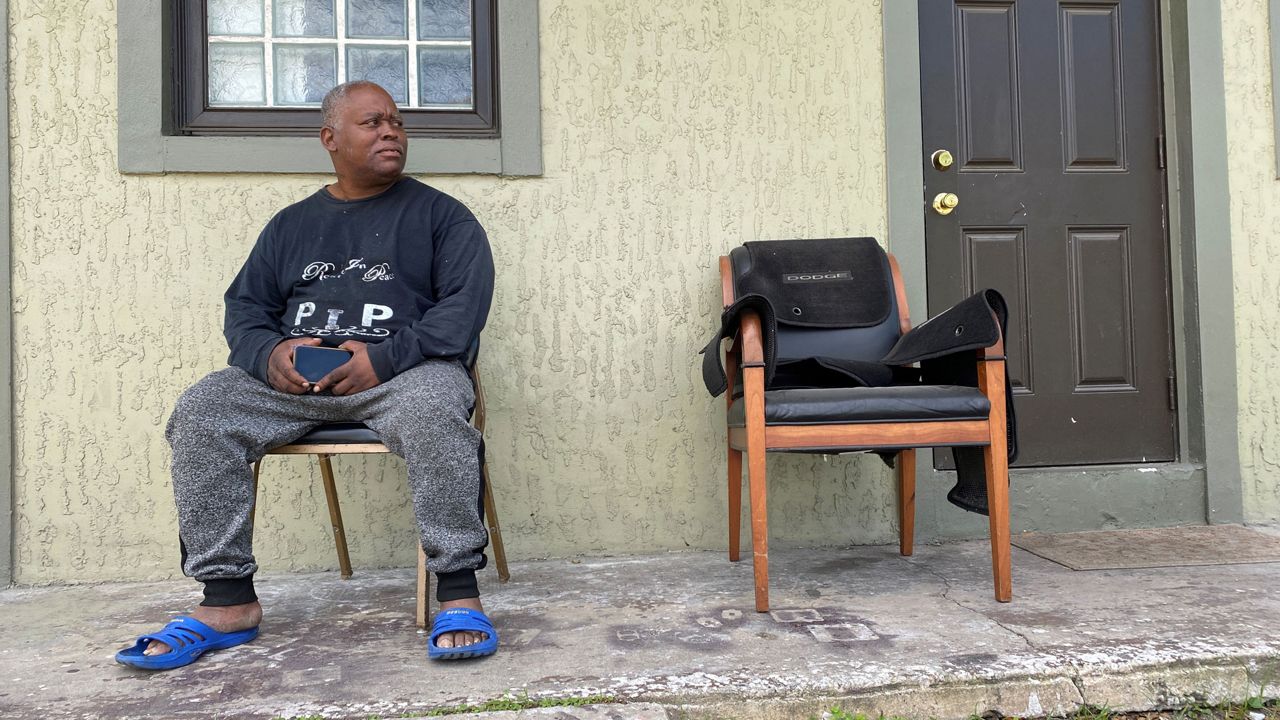ORLANDO, Fla. — Parramore renter Brennen Hill recently learned you can’t take anything for granted — not even a flushing toilet.
Hill said he and his son recently spent several days bathing out of a plastic bucket, after their building’s sewage connection was temporarily cut off by a developer doing construction on the property next door.
“It was … a very horrific week to deal with,” Hill said.
What You Need To Know
- Developer building affordable housing in Parramore
- Said he was permitted to tear out a lateral line that actually connected a next-door duplex to the city sewer line
- Developer says the city approved the move, even though it left the duplex without sewer access
Hill rents the downstairs unit of a Parramore duplex from property owner Vincent Seay, who said he felt “bullied” after the city of Orlando threatened to condemn his building over a sanitation issue Seay himself didn’t cause.
“As a Black man, I'm trying to save generational wealth for my kids,” Seay said. “Now this is an investment I've made, and it's a poor neighborhood. How can big business and the city just run me out?”
Seay said he worked hard to rehabilitate his 1960s-era building after purchasing it in 2016. Ever since he bought it, his building has always had a sewage hookup, Seay said.
That’s why Seay was so surprised to hear from the city that his building did not appear to be connected to the sanitary sewage system.
“My building (has) been here 60 years,” Seay said. “Why (are) you telling me now I don't have a sewer line?”
A Problem Decades in the Making
Seay’s sewage problem began in February, when developer Robert Vazquez said the city gave him approval to remove the green sewage pipe Vazquez found running beneath his property.
But in reality, the problem began long before then.
Back when Seay’s property was built in 1967, it was part of a larger property developed under single ownership, according to Orlando spokesperson Samantha Holsten. At that time, Seay’s property was connected to the city’s main sewer line through a lateral, which is the pipe that connects a home’s plumbing to the city’s sanitary sewer.
But sometime during the 1970s, a portion of the original property was sold, Holsten said. Now, that piece of land belongs to the United Deliverance Christian Church.
“It appears at that time, a new lateral was installed such that both properties ... could use a common lateral connection into the city's line on Randall Street,” Holsten wrote to Spectrum News in an email. “Unfortunately, portions of this new lateral system crossed onto (a) neighboring private property, where it has been operating for about 40 years.”
Enter Robert Vazquez, the affordable housing developer who’s working to construct four new homes on the formerly vacant lot right next door to Seay’s.
Vazquez said he contacted the city of Orlando after his construction team found some unfamiliar sewage pipe on his property. He said the city approved him — on multiple occasions — to tear up the sewage line connecting to Seay’s property.
“The city said that everything here had been abandoned, and (to) proceed to demolish the structure, or continue our earthwork,” Vazquez said.
After the pipe was torn up, the concerned phone calls began. Vazquez’s staff told him they’d apparently disconnected sewage access to the building next door.
Again, Vazquez contacted the city, he said — and again, the city told him to proceed.
“They verified that nothing here was on the property,” Vazquez said. “Clearly, that wasn’t true.”

Affordable Housing Delays?
It’s not clear why exactly the city of Orlando approved Vazquez to remove Seay’s sewer line. Holsten told Spectrum News she was unable to confirm Vazquez’s report.
Now, though, the city has taken action, already installing a new lateral to connect Seay’s building directly to the main sewer line.
Vazquez said he’s still left feeling discouraged, though. The city’s alleged oversight has contributed to permitting delays, the developer said, majorly slowing his team’s progress in building four single-family homes targeted for affordable homeownership.
“The majority of folks who live here (in Parramore) are renters and not owners,” Vazquez said. “We’d like to transition that and provide affordable housing for individuals that desperately need it in this area.”
But mistakes like this one delay the development of that necessary housing, Vazquez said.
“The left hand doesn't seem to know what the right hand's doing,” Vazquez said of the city in this case.
Vazquez doesn’t blame Seay for the sewage debacle. After Seay got an emergency permit from the city to temporarily reconnect his building — an approximately $800 job, which Seay had to pay for himself — Vazquez allowed Seay to dig a trench on his property, so his tenants could have sewage access once more.
On the other side of the fence, Seay expressed a sense of pride for the building he was able to purchase in Parramore.
“I'm not big business,” Seay said. “But I worked hard to earn this property.”
For his part, Hill is just grateful to be able to take a shower again.
“It's great to have water back and the regular system running,” Hill said. “I wouldn't have ever thought it would mean that much, but I'm happy to have my services back.”
Molly Duerig is a Report for America corps member who is covering affordable housing for Spectrum News 13. Report for America is a nonprofit national service program that places journalists in local newsrooms to report on undercovered issues.



